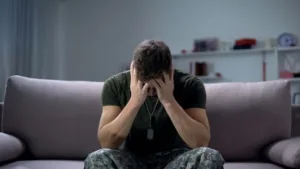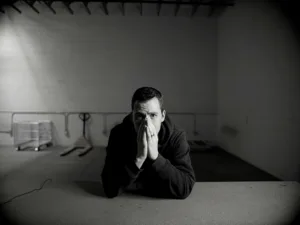Male anxiety in relationships is something many guys deal with, but it’s often ignored. Figuring out why we feel this way can help us see how it affects relationships. By learning about male relationship anxiety, we can understand how men feel and act in close relationships. This blog is important for understanding each other better and improving how couples communicate and relate to each other.
Key Takeaways
Understanding the Causes: Recognizing the root causes of male anxiety in relationships, such as societal expectations and personal experiences, is crucial for addressing and managing it effectively.
Impact of Past Relationships: Past relationship experiences can significantly influence male anxiety in current relationships, highlighting the importance of processing and healing from past emotional wounds.
Influence of General Anxiety: Generalized anxiety can exacerbate male anxiety in relationships, emphasizing the need for holistic approaches that address both general and relationship-specific anxiety.
Significance of Attachment Styles: Exploring attachment styles can provide valuable insights into how individuals approach and experience relationships, offering a framework for understanding and navigating male anxiety.
Practical Application of Attachment Styles: Recognizing attachment styles in action within relationships can help individuals tailor their responses and behaviors to support healthier relationship dynamics and reduce anxiety triggers.
Effects on Relationship Dynamics: Understanding how male anxiety impacts relationships can foster empathy, communication, and mutual support, leading to stronger and more fulfilling connections.
Causes of Male Relationship Anxiety
Past Relationships
Male anxiety in relationships can stem from past toxic relationships, leading to worry the same things could happen again and fear of vulnerability in current partnerships. Unresolved emotions from previous relationships can create a sense of distrust and insecurity, impacting the ability to form healthy connections.
Childhood Trauma
Trauma experienced during childhood can significantly affect how men engage in adult relationships. Events like neglect or abuse can result in, poor self-esteem, generalized anxiety, insecurities, and difficulties with intimacy. These unresolved issues may manifest as anxiety, fear of abandonment, or challenges in expressing emotions within a relationship.
Therapy for Healing
Seeking therapy is crucial for addressing relationship trauma and enhancing self-esteem. Through therapy, men can explore their past experiences, process unresolved emotions, and develop healthier coping mechanisms. EMDR therapy is often a good fit for men and trauma. This proactive approach can lead to improved communication skills, increased emotional intelligence, and a stronger sense of self-worth.
Impact of Past Relationships
Childhood Attachment
Our early experiences with caregivers significantly influence our adult attachment style in relationships. Secure attachments in childhood often lead to healthier adult relationships, while insecure attachments can result in difficulties in forming and maintaining intimate connections.
Shaping Current Styles
Past relationships serve as a blueprint for how we approach new ones. Positive experiences can enhance trust and emotional intimacy, whereas negative encounters may breed insecurity and fear of vulnerability.
Projecting Emotions
When unresolved issues from past relationships linger, individuals tend to project emotions onto current partners. This projection can create unnecessary conflicts and strain the dynamics of the relationship.
Breaking Negative Patterns
It is crucial to recognize and address negative patterns stemming from past relationships. By actively working on self-awareness and seeking therapy if needed, individuals can break free from detrimental cycles and foster healthier connections.
General Anxiety
Male Anxiety
Anxiety in men is a prevalent issue, often underreported due to men seeking help less often than women. “Men and women similarly experience anxiety symptoms. Men also often experience anger, and irritability and may use substances to cope” says Stephen Rodgers, LCSW, a psychotherapist at Denver Men’s Therapy.
Men’s anxiety can manifest in different ways, impacting their relationships, work performance, and overall well-being. The tendency to internalize reasons for anxiety can create barriers in communication and emotional expression.
Addressing Anxiety
Identifying the kind of anxiety one experiences is crucial for effective management. Men are encouraged to seek professional help to understand and address underlying issues contributing to their anxiety disorders.
Seeking therapy or counseling can provide tools to manage anxiety symptoms.
Engaging in activities like exercise or mindfulness practices can help alleviate anxiety.
Building a support network of friends or loved ones can offer emotional reassurance during times of heightened stress.
Attachment Styles Explained
Attachment theory, created by psychologist John Bowlby in the 1950s, explains how attachment styles form from relationships between infants and young children and their main caregivers. This well-established theory says that early interactions mostly decide what kind of attachment style someone will have as an adult. It should be noted that attachment styles in adults are not fixed, rather they can change through experiences like healthy relationship experiences and psychotherapy. These styles include secure, anxious, avoidant, and disorganized:
Secure Attachment: Develops when caregivers are generally consistently responsive and sensitive to the child’s needs, leading to feelings of security and trust. For example, if the child is scared and crying the caregiver will soothe and help them to feel safe again.
Anxious Attachment: Emerges from inconsistent caregiver responsiveness, which creates anxiety and uncertainty in the child about the availability of the caregiver.
Avoidant Attachment: Results from caregivers who are often emotionally unavailable or unresponsive, leading the child to become self-sufficient and minimize emotional closeness.
Disorganized Attachment: This occurs when the caregiver behaves in erratic or frightening ways, leading to a lack of clear attachment strategy and contradictory behaviors in the child.
Attachment theory suggests that these early attachment styles can influence relationships throughout life, affecting emotional, social, and psychological development.
Anxious attachment adults seek excessive reassurance and fear abandonment in relationships. They often feel insecure, have low self-esteem and may require constant validation from their partners. “An adult with an anxious attachment style deep down worries if their partner will be there when they are needed or that they don’t really love me” explains Rodgers.
Growing up with inconsistent caregiving, and anxious attachment adults tend to exhibit clingy behavior, jealousy, and emotional highs and lows in relationships. However, it should be noted that for some adults may not engage in these relationship dynamics until they are triggered in the relationship. In other words, day to day they may appear to have a secure attachment style, but when they become triggered by something related to the relationship they engage in anxious attachment behaviors.
Childhood Influence on Adult Relationships
Childhood experiences shape attachment styles, impacting how individuals interact romantically in adulthood. For instance, a secure childhood attachment fosters trust and confidence in relationships.
Children with an anxious attachment may struggle with self-worth, leading to a constant need for approval and validation in adult relationships. This can create misunderstandings and conflict.
Subconscious Sabotage
Insecurities stemming from childhood can unconsciously sabotage adult connections. Individuals with anxious attachment may push their partners away due to fear of rejection or abandonment.
These subconscious behaviors can hinder intimacy and communication, making it essential to address underlying attachment styles for healthier relationships.
Attachment Styles in Action
Manifestation of Anxious Attachment Style
Anxious attachment style manifests in adult relationships through constant seeking of reassurance and validation. Individuals with this style often exhibit physical signs of anxiety like restlessness and nervousness.
This attachment style can lead to excessive contact with partners, seeking constant reassurance or becoming overly dependent on them. This behavior may push others away, creating a cycle of insecurity and fear of abandonment.
Problems Caused by Anxious Attachment Style
For men, anxious attachment style can result in difficulties in trusting their partners fully. They may constantly seek validation from their partners, leading to issues such as jealousy or possessiveness.
Men with anxious attachment style may misinterpret innocent actions by their partners as signs of rejection or neglect, causing unnecessary conflicts and misunderstandings. This can create a point of tension in the relationship.
Importance of Self-Awareness
Breaking negative attachment patterns requires self-awareness and introspection. Recognizing one’s own attachment style and understanding how it influences behaviors is crucial for fostering healthier relationships.
Developing self-awareness can help individuals identify triggers that activate their anxious attachment behaviors, allowing them to consciously work towards more secure and fulfilling relationships.
Anxiety’s Effects on Relationships
Controlling Behavior
Some men, not all, who experience relationship anxiety may attempt to reduce their anxiety by controlling their partner. The urge to control is a common maladaptive coping strategy for anxiety. Controlling or abusive behavior is unexpectable in any relationship.
Impact on Communication
Relationship anxiety can significantly hinder effective communication between partners. Individuals experiencing this type of anxiety may struggle to express their thoughts and feelings openly. They might find it challenging to communicate their needs and concerns, leading to misunderstandings.
Anxiety in relationships often manifests as fear of rejection or abandonment, causing individuals to hold back from sharing their true emotions. This lack of open communication can create a barrier between partners, making it difficult to build trust and intimacy.
Role in Creating Distance
Anxiety plays a crucial role in creating emotional distance between partners. When one partner is constantly anxious about the relationship, they may become overly sensitive to perceived threats or signs of rejection. This hypersensitivity can lead to unnecessary conflicts and push the other partner away.
Moreover, relationship anxiety can breed insecurity and doubt, causing individuals to withdraw emotionally as a defense mechanism. This withdrawal can further widen the gap between partners and result in feelings of loneliness and isolation within the relationship.
Impact on Conflict Resolution
Untreated anxiety can escalate minor disagreements into major conflicts within relationships. Individuals struggling with relationship anxiety may react impulsively or defensively during disagreements, intensifying the conflict. This pattern of unresolved conflicts can lead to a cycle of dissatisfaction and resentment between partners.
Strategies for Managing Anxiety
Self-Care
Implementing self-care routines is crucial in alleviating relationship anxiety. Engage in activities that promote relaxation and well-being, such as exercise, hobbies, or spending time with loved ones.
Breathwork and Guided Meditation
Breathwork and guided meditation are effective tools to reduce anxiety levels. These practices help calm the mind, regulate emotions, and enhance overall mental clarity.
Box breathing, also known as square breathing, is a simple yet powerful relaxation technique that can help manage stress and improve mental clarity. It’s often used in high-pressure environments or to calm the mind before an important task. Here’s a step-by-step guide to practicing box breathing:
Find a Comfortable Position: Sit or lie down in a comfortable position. You can do this exercise anywhere, but try to minimize distractions.
Exhale Completely: Start by gently exhaling through your mouth to empty your lungs completely.
Inhale: Close your mouth and quietly inhale through your nose to a slow count of four. Try to fill your lungs completely, expanding both your belly and chest.
Hold Your Breath: Hold your breath for another count of four. Avoid clenching your muscles; instead, relax as much as possible.
Exhale: Open your mouth slightly and exhale through your lips for a count of four. Release the air in your lungs slowly and steadily, emptying completely.
Hold Again: After exhaling, hold your breath for another four counts before beginning the cycle again.
Repeat these steps at least four times, or continue for a few minutes until you feel more relaxed. Box breathing can be practiced multiple times a day as needed to reduce stress or improve focus.
Positive Self-Talk
Practicing positive self-talk can significantly impact managing anxious thoughts. Challenge negative beliefs with affirmations and constructive self-assurance to cultivate a healthier mindset.
Open Communication and Professional Help
Maintaining open communication with your partner about your feelings and concerns is vital for anxiety management in relationships. Do not hesitate to seek professional help, such as therapy or counseling, to address underlying issues causing anxiety.
Improving Emotional Expression
Open Communication
Expressing feelings openly and honestly is crucial in relationships. It allows both partners to understand each other better. When men share their emotions, it strengthens the bond with their partners.
Communication should be a two-way street, where both individuals feel safe expressing themselves. By sharing their feelings, men can create a sense of intimacy and connection with their partners.
Benefits of Emotional Expression
Improving emotional expression has various benefits for couples. It leads to a deeper sense of love and understanding between partners. When men express their emotions effectively, it fosters a healthier relationship dynamic.
Summary
Understanding the roots of male anxiety in relationships is key to fostering healthier connections. Past experiences and attachment styles heavily influence how anxiety manifests and impacts your relationships. By recognizing these patterns, you can actively work on managing your anxiety and improving emotional expression within your partnerships. Remember, seeking professional help or therapy is always a valid option to delve deeper into these issues and enhance your relationship skills further.
Frequently Asked Questions
What are some common reasons for male anxiety in dating relationships?
Male anxiety in relationships can stem from various factors such as fear of rejection, communication issues, past relationship trauma, societal expectations, and self-esteem issues.
How do past relationships impact male anxiety in current relationships?
Past relationships can influence male anxiety by creating trust issues, fear of vulnerability, attachment insecurities, and emotional baggage that affect how they perceive and behave in current relationships.
What role do attachment styles play in male anxiety within relationships?
Attachment styles like anxious-preoccupied, dismissive-avoidant, fearful-avoidant, and secure can significantly impact how males experience and express anxiety within their relationships based on their patterns of intimacy and dependency.
How does male anxiety affect the dynamics of a relationship?
Male anxiety can lead to behaviors like jealousy, overthinking, withdrawal, or seeking constant reassurance. This can strain communication, create misunderstandings, trigger conflicts, and hinder emotional connection within the relationship.
What are some effective strategies for managing male anxiety in relationships?
Managing male anxiety involves fostering open communication, practicing self-awareness, seeking therapy or counseling if needed, setting healthy boundaries, challenging negative thought patterns, engaging in self-care activities, and developing coping mechanisms to regulate emotions.














